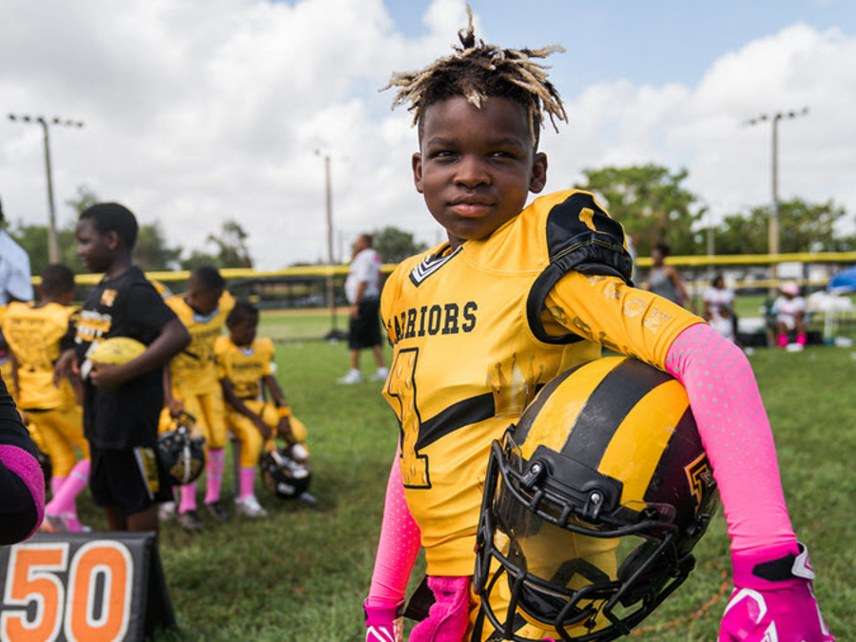Rough Insights into Urban Decay, Through the Eyes of a Kids' Football Program
The Warriors of Liberty City documents harsh lives in Miami through its children.
The Warriors of Liberty City. Starz. Sunday, September 16, 8 p.m.

From its opening moments, it's clear that The Warriors of Liberty City is not your standard-issue football documentary. The players halt their practice when a phalanx of police helicopters passes slowly over the field, drowning out everything until it's gone. "Something going on in the city," shrugs one of the spectators. "Probably somebody got shot. … In Liberty City, man, this is every day. It's how we live."
Liberty City is about four square miles at the hard-bitten center of Miami. You might remember it as Ground Zero of a deadly 1980 race riot, touched by the acquittal of a group of cops who beat a black motorcyclist to death for leading them on a high-speed chase. (Final cost: 18 lives, $100 million in damage.) Or you may recall it as one of the rancid urban battlegrounds in the Grand Theft Auto video games.
But in addition to the junkies, muggers, hookers, gang-bangers and punks who populate the Grand Theft Auto games—who, to be sure, are real enough—Liberty City is home to maybe 30,000 people or so just trying to get by, picking their way through the detritus of a mad level of urban dysfunction that's largely not of their making.
The Warriors, a six-episode documentary series running on the Starz cable channel, is nominally about Liberty City's Pop Warner football team. (Or, more correctly, teams, plural: There are 10 squads, divided among Pop Warner's various age groups from 4 to 15.) But it's really a window into life inside the inner city, where—contra The Wire—not everybody is out on the corner hustling dime bags.
It is, however, a diminished world, where ambitions are modest and, nonetheless, often unmet. The mother of one player, sitting in a cramped housing-project apartment meant for three people but holding six, is asked what she would really like to have. Her wistful dream: "Get up to a bigger place and the kids can go in the backyard and probably don't hear no gunshots." Admits her husband, a public housing maintenance man: "I got 27 sheets on my rap page. I ain't no good guy." Yet he takes some small pride that he's gotten off the street, stayed with his family and supported it as best he can, unlike his own father, who "was nothin' but a goddam' sperm donor."
Another father is heard from only on the telephone, which he's using to talk to his son from a from a far-off prison cellblock. He gruffly chides the boy for getting a C in history—the unspoken subtext is, listen to me, don't make my mistakes, you can do better—but his voice soften for the sign-off: "Daddy love you." After the call, the son talks matter-of-factly about what it's like to not have a father around on Father's Day. And he confides that "sometimes I get mad, because he left twice, he went to jail twice, all for stupid reasons," and his face crumples.
Among the most poignant characters in The Warriors is one of the team's cheerleaders, 13-year-old Destiny, whose pragmatic acceptance of Liberty City's jagged edges does not mask her insights. After taking a walk with a cameraman, chattily pointing her neighborhood's highlights ("around here, most of these houses got shot up, my parents don't like me walking around here") she offers a quiet complaint: "The hardest thing, growing up in Liberty City, is that people who don't live in Liberty City think all of us are the same, like ghetto, fighting all the time."
Of course, there is fighting in Liberty City, and The Warriors makes no attempt to shoved it under the covers. Among the show's main story lines are the reactions of his teammates to the murder of their quarterback, 6-year-old King Carter, who got caught in a crossfire as he walked to a neighborhood store to buy candy.
The kids don't talk much about it openly, but King's death lurks in the background of much of the show. When George, a 9-year-old Warriors running back, is talking with his dad about the tattoo he's going to get on his 18th birthday, his brow furrows as he describes it: "A tree of my family, all the people that died that I know."
Producer-director Evan Rosenfeld learned his filmmaking skills at Miami's Rakontur studios, which produced the documentaries Cocaine Cowboys and The U. His sober style serves him very well in The Warriors; his interviews never seemed forced or melodramatic, just chats with a neighbor over coffee.
Nor—though the temptation was surely there—does he turn the show into Rocky with cleats and helmets. There's relatively little game footage in The Warriors, and its consideration of the thrill of victory and the agony of defeat takes place entirely off the gridiron. As a Warriors coach says of his players: "They're not statistics."


Show Comments (7)